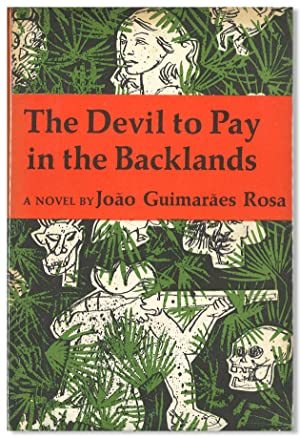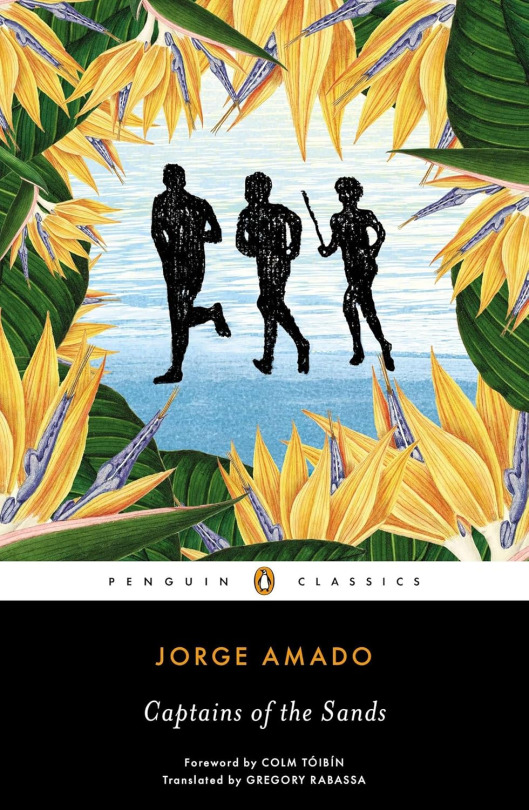Journey Through The Backlands
Journey Through the Backlands

"Did that make sense? But he was neither crazy nor worried, nor ready for hanging. Even when a capybara sits, it does so to think, not to lose heart."
About the Book
Title: The Devil to Pay in the Backlands Author: João Guimarães Rosa Published: 1956 Original Title: Grande Sertão: Veredas
Summary
The Devil to Pay in the Backlands blends mysticism, philosophy, and the reality of Brazilian life in the arid Northeast. The narrator, Riobaldo, is a former jagunço who recounts his journey through the backlands.
Key Themes
Good vs. Evil
Destiny
Violence
Searching for meaning
More Posts from Carnivalofstories and Others
City of God

"It was kite-flying time in City of God."
About the Book
Title: City of God Author: Paulo Lins Published: 1997 Original Title: Cidade de Deus
Summary
If you’ve ever heard of the Brazilian movie City of God, you already have an idea of how the story unfolds. The novel follows the lives of the residents of Rio de Janeiro’s most notorious favela, offering a glimpse into the harsh reality of poverty.
Key Themes
Crime
Violence
Drug Trafficking
Social Inequality
America

"Who has taught you, white warrior, my brothers' tongue? From where have you come to these woods, which have never seen another warrior like you?"
About the Book
Title: Iracema Author: José de Alencar Published: 1865 Original Title: Iracema
Summary
The story follows the romance between Iracema, an indigenous woman, and Martim, a Portuguese colonizer. Iracema's name is an anagram of America. There is a lot of critique of colonialism in this story, as Martim represents the colonizers (the Portuguese).
Key Themes
Colonialism
Heritage
Cultural clash
National Identity
Clove and Cinnamon

“Isn’t that what it is? Love—the most wonderful and most terrible thing in the world.”
About the Book
Title: Gabriela, Clove and Cinnamon Author: Jorge Amado Published: 1958 Original Title: Gabriela, cravo e canela
Summary
The book is set in the 1920s in Ilhéus, a town experiencing a boom in the cacao industry. The novel follows Gabriela, a migrant worker who captivates the bar owner, Nacib, and from this, their love story unfolds. As with most of Jorge Amado's works, it is a highly sensual story.
P.S. There are at least three TV adaptations of this novel in Brazil. It is a very popular story.
Key Themes
Desire
Power dynamics
Gender roles
Social change
Tradition vs. Progress
Love and Revenge

"Convinced that all those who professed love for her, without exception, sought only her wealth, Aurelia reacted to this affront by responding to these individuals in kind."
About the Book
Title: Senhora: Profile of a Woman Author: José de Alencar Published: 1875 Original Title: Senhora
Summary
Senhora follows Aurélia Camargo, a young woman who inherits a fortune and uses it to buy back her former fiancé, Fernando Seixas, who once abandoned her for a wealthier match. As her plan for revenge unfolds, Aurélia finds herself torn between love and pride.
P.S. There is a happy ending.
Key Themes
Love vs. money
Female agency
Honor
Idealist vs. reality
This book was burned during the military dictatorship

"In the mysterious night of the macumbas the drums resound like trumpets of war."
About the Book
Title: Captains of the Sand Author: Jorge Amado Published: 1937 Original Title: Capitães da Areia
Summary
Captains of the Sand is set in the city of Salvador and follows the story of a group of orphaned boys living on the streets. They survive through petty theft and share a deep sense of brotherhood. Their leader is Pedro Bala, a boy who is protective of his gang.
The book was banned during the Brazilian military dictatorship for its portrayal of poverty and its perceived communist ideas. It was even burned in a public square in November of 1937, alongside other books (mostly from Jorge Amado).
P.S. There are many things you will not agree with in the book, and it contains an explicit rape scene.
Key Themes
Poverty
Injustice
Social Exclusion
Survival
Did she cheat or not?

"Capitu, in spite of those eyes the devil gave her … Have you noticed her eyes? They’re a bit like a gypsy’s, oblique and sly."
About the Book
Title: Dom Casmurro Author: Machado de Assis Published: 1900 Original Title: Dom Casmurro
Summary
Dom Casmurro follows the story of Bentinho, a man who reflects on his past, particularly his relationship with Capitu. He raises questions about whether his suspicions regarding Capitu's fidelity are true or merely the result of paranoia. Additionally, they have a son who Bentinho believes does not resemble him at all.
Bentinho is an unreliable narrator, as he is the sole person telling the story, and the author makes us question whether he is telling the truth or not.
Key Themes
Jeaslisy
Memory vs. Perception
Love and Trust
Unreliable Narrator
A true story

"It is truly regrettable that in these times we do not have a Maudsley, who knew the difference between good sense and insanity, to prevent nations from committing acts of madness and crimes against humanity."
About the Book
Title: Backlands: The Canudos Campaign or Rebellion in the Backlands Author: Euclides da Cunha Published: 1902 Original Title: Os Sertões
Summary
This book is a retelling of the War of Canudos (1896–1897), which took place in the state of Bahia. The writer, Euclides da Cunha, was a correspondent for the Brazilian newspaper O Estado de S. Paulo. It is considered the first livro-reportagem (reportage book) in Brazil. Mixing science and literature, the story narrates the war between the republican army and the sertanejos.
Key Themes
True story
Resistence
War
Brazilian backlands
Finding Your Destiny

"The boy could see in his father’s gaze a desire to be able, himself, to travel the world—a desire that was still alive, despite his father’s having had to bury it, over dozens of years, under the burden of struggling for water to drink, food to eat, and the same place to sleep every night of his life."
About the Book
Title: The Alchemist Author: Paulo Coelho Published: 1988 Original Title: O Alquimista
Summary
The Alchemist follows the journey of Santiago, a shepherd from Spain who dreams of finding a hidden treasure near the Egyptian pyramids. His quest takes him to many places, where he encounters wise mentors and people who help him along the way.
Santiago learns about the importance of following his heart and pursuing his personal legend. The story is very spiritual and talks a lot about philosophy.
Key Themes
Destiny
Dreams
Self-discovery
Spiritual enlightenment
What is sanity?

“Were they all really insane? Did I really cure them? Or is not mental imbalance so natural and inherent that it was bound to assert itself with or without my help?”
About the Book
Title: The Alienist Author: Machado de Assis Published: 1882 Original Title: O Alienista
Summary
Dr. Simão Bacamarte is a brilliant but obsessive physician that made his life mission the study of mental illnesses in the small town of Itaguaí. Convinced he know how to determine who is sane and who is insane, the doctor begins commiting patients based on a rigid and weird criteria. Too emotional? Locked up. Too rational? also locked up.
This book is a mix of satire, irony, and existential dread. Who gets to decide what is insane? What is sanity? Machado de Assis challenges the reader to question everything about reason, while also critiquing the medicalization of traits that, in his time, were considered mental illness (like hysteria).
Key Themes
Science vs Humanity
Satire
Power
Madness vs Reason
Slum

"And on the muddy ground covered with puddles, in the sultry humidity, a living world, a human community, began to wriggle, to seethe, to grow spontaneously in that quagmire, multiplying like larvae in a dung heap."
About the Book
Title: The Slum Author: Aluísio Azevedo Published: 1890 Original Title: O Cortiço
Summary
The Slum tells the story of a tenement in Rio de Janeiro and the lives of its inhabitants. There are many characters in this story, but the slum itself is considered the main protagonist. Aluísio Azevedo paints a portrait of Brazilian society in the late 19th century.
Key Themes
Social commentary
Urbanization
Prejudice
Class struggle
Environment influence on human behavior

Celebrating Brazilian stories through book recommendations
22 posts